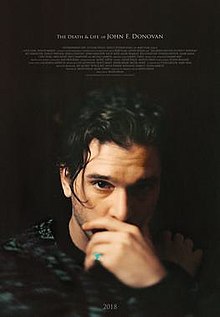by Chris Feil
 The party of Xavier Dolan is petering out. Or at least for his crowd of defenders, the noble few who have been willing to see past histrionics for the queer pop opera of his cinema. But for all of the detractive claims of the young director consistently falling down his own rabbit holes, it stands to ask what people want from the cinema if not directors drunk on their own Kool-Aid.
The party of Xavier Dolan is petering out. Or at least for his crowd of defenders, the noble few who have been willing to see past histrionics for the queer pop opera of his cinema. But for all of the detractive claims of the young director consistently falling down his own rabbit holes, it stands to ask what people want from the cinema if not directors drunk on their own Kool-Aid.
And yet his newest effort, The Death and Life of John F. Donovan, is the toughest to defend. Despite some moments when the film really hits its stride, Dolan is mostly merely strident, crafting a trolling work that dares you to not call it as petulant as it is. His films have been called nakedly autobiographical or trite, and this film turns those whiffing dismissals into text. Is one person’s trash the next person’s honesty, in all its cringeworthiness and misguided perceptions? Does what is genuine and true about the thing we deem unworthy still have merit despite our perceptions of its limitations? These are fascinating questions that this film can’t quite elevate or answer, and the results are frequently embarrassing.
Kit Harrington is the titular actor, a C-list heartthrob not known for his talents but still appreciated by the mid-00s teen set. His biggest fan may very well be Jacob Tremblay’s Rupert Turner, a child actor transplant to the UK that begins to exchange letters with the star that detail his struggles with fame, his career, and his personal life. The film is told in flashbacks as the elder Rupert publishes a memoir about the experience in 2017, interviewed by the curmudgeoniest cliche of a reporter by Thandie Newton (whose charms can’t even be stifled by this obvious of material, it appears). Donovan’s ensuing death, timed after the letters come under public scrutiny, remains an enigma the hangs over his persona.
The unfortunate thing is that Donovan shows that while Dolan is still an ambitiously florid and evocative filmmaker, criticism through storytelling is a muscle he may not yet be ready to flex. Ben Schnetzer plays the older Rupert opposite Newton, declaring that he knows his subject is “not rebuilding Aleppo”, a distinction that is at once appropriately self-aware and an inappropriate choice for comparison. The film wants to be taken seriously, its earnestness only ever fleetingly successful at being a critique of our perception of it. But mostly, it faceplants into just becoming precisely what the director has been accused of with less ambitious films. With Tremblay spouting outlandishly precocious venom and Newton forced into grand cliche of a journalist, you feel the film making itself a target and to no substantial end.

The film is defendable in pieces, particularly when it muses on our internal relationship between identification in our idols and mere projection, and the distance between both endposts. Rupert is bullied mercilessly for his gayness while Donovan remains closeted, the idol never as self-affirmed as the idolator. Natalie Portman as Rupert’s frustrated mother is both barking jealous shrew and sacrificial angel of the minds of all gay boys. How much can you really judge Dolan’s authenticity when his point is that perception is reality?
And yet the film is unfortunately mired in gaucheness and still feels like the roughest of drafts on an ambitious larger project (even right down to the song choices that feel like temporary placeholders like the opening oddball use of “Rolling in the Deep”). Somewhere underneath its misguided attempt at understanding the Hollywood legends we build in our minds and tear down in public is something as compassionate and layered as the film’s thesis tells us it is, but resulting The Death and Life of John F. Donovan isn’t it.
Most lost among the muck? The genuine, true compassion that the film itself demands we pay its subject. And some of us still want to feel that from the filmmaker.
Grade: C-